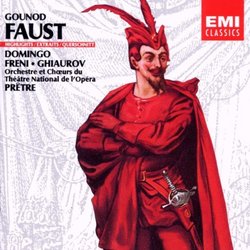| All Artists: Marc Vento, Charles Gounod, Georges Prêtre, Paris National Opera Orchestra, David Bell, Michele Command, Mirella Freni, Plácido Domingo, Thomas Allen Title: Charles Gounod: Faust (Highlights) Members Wishing: 0 Total Copies: 0 Label: EMI Classics Release Date: 6/6/1989 Genre: Classical Style: Opera & Classical Vocal Number of Discs: 1 SwapaCD Credits: 1 UPCs: 077776309026, 077776309057 |
Search - Marc Vento, Charles Gounod, Georges Prêtre :: Charles Gounod: Faust (Highlights)
 | Marc Vento, Charles Gounod, Georges Prêtre Charles Gounod: Faust (Highlights) Genre: Classical
|
Larger Image |
CD Details |
CD ReviewsA Faust That Soars 03/17/2005 (5 out of 5 stars) "This recording of Gounod's Faust made in the late 70's, stars Placido Domingo, Mirella Freni and Nicolai Ghiuarov, a powerful trio which is reason enough in itself to seek this album for purchase. Opera fanatics, such as myself, are never content with one recording of one opera, when they can indulge in a variety of singers and styles of conducting. I own this recording and the one with Hadley, Gasdia and Samuel Ramey. Now, while I think this is a great Faust, it is only second best to the recording with Hadley/Gasdia/Ramey, mainly because the real spirit of the work, active in the orchestration and especially in the bass voice of Samuel Ramey, is more true to Charles Gounod's vision. This one, though, holds its own, mainly through the dramatic prowess and rich vocals of tenor Placido Domingo, soprano Mirella Freni and her husband bass Nicolai Ghiurov. Pretre, who is French, is also enjoying his slow pace of conducting, probably slowing down what ought to be faster so as to focus on the lush lyric beauty of the French style of the lead singers who have mastered the French technique down to a "T". Superb, top-notch performances by all three lead singers is what makes this album so attractive. These are only highlights from the full length album. In this album, we find the opening chorus, the Waltz and the scene in which Faust meets Marguerite in person for the first time, the Devil's "Calf Song", Marguerite's "Jewel Song", the Church Scene in which Marguerite prays while the Devil and demons mock her, and the awesome Trio Finale "Ange Pure, Ange Radieux". For Gounod, Faust proved a masterpiece and the one opera that would become a standard repertoire for most opera companies at that time and now. The Met opened in the 1880's with Faust. It's the tragic tale of a pathetic elderly scholar/scientist who longs for eternal life and youth and romance. When the Devil tempts him with a vision of the beautiful village girl Marguerite, and offers him youth and good looks, he makes a deal with the Devil, offering up his soul. The plan takes effect when Marguerite, seduced by jewelry and materialistic things, is seduced by Faust. She eventually becomes pregnant with his baby. At the end of the opera, Faust is dragged to Hell while Marguerite is saved and ascends to Heaven. Faust, written by the German writer Goethe, figured in a lot of Romantic Era 19th century music. Berlioz composed La Damnation De Faust and Boito wrote "Mephistophele", while the "diabolically radical" composer Franz Liszt enjoyed composing themes on Faust and symphonic poems about it." Domingo, Freni, Ghiurov, Success! Rudy Avila | Lennox, Ca United States | 08/09/2005 (5 out of 5 stars) "Faust has never sounded more lush and dramatic than in the hands of these seasoned singers. Placido Domingo as Faust is appropriately conflicted, emotional and romantic. He gets into character from his first scene as he curses God for his futile existence and old age and to his last scene when he is dragged to Hell. Mirella Freni is in fine voice as Marguerite, truly her performance is the greatest of all possible Marguerites on record or stage. She's got a full lyric voice that soars with passionate intensity (the Church scene and the last scene in which she tries to save Faust from damnation and she's sent to Heaven). Her husband (or soon to be husband depending on the time of this recording) bass Nicolai Ghiurov, a great Russian bass, is on fire as the Devil, with all the darkness and power in his vocal performance alone. George Petre, a famed French conductor leads a primarily French orchestra with singers who are absolutely brilliant in their mastery of the French text. This cd offers only highlights (not the full-length recording available on Amazon.com as well). Here are the Waltz, the Calf Song, Marguerite's ornate "Jewel Aria" the Church Scene complete with demonic chorus, and the outstanding Final Trio (Ange Pure Ange Radieux)which I feel could somehow be better but is not all that bad. A great highlights CD."
|

 Track Listings (10) - Disc #1
Track Listings (10) - Disc #1